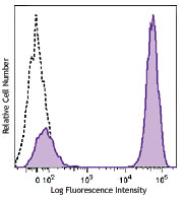-
Sign In
-

-
 Sony Biotechnology
Sony Biotechnology
-

-
 Sony Biotechnology
Sony Biotechnology
Brilliant Violet 605™ Streptavidin
Antibodies Single
Sony
Flow Cytometry
Mouse IgG1, κ
Human,Mouse,Rat
100 µl
2626145
$244.00
Description
Streptavidin binds to biotin with high affinity. Streptavidin-Brilliant Violet 605™ is useful for detecting biotinylated antibodies. The excitation of Brilliant Violet 605™ by 405 nm laser light induces a fluorescence maximum emission of 603 nm.
Formulation
Phosphate-buffered solution, pH 7.2, containing 0.09% sodium azide and BSA (origin USA).Recommended Usage
Each lot of this Streptavidin-Brilliant Violet 605™ is quality control tested by immunofluorescent staining with flow cytometric analysis. The concentration provided is based upon molecular mass of streptavidin independent of any additional molecular mass that might be added by the Brilliant Violet 605™ conjugation. For immunofluorescent staining, we recommend using ≤0.25 microg in 100 microL staining volume per million cells. It is recommended that the reagent be titrated for optimal performance for each application.
Brilliant Violet 605™ excites at 405 nm and emits at 603 nm. The bandpass filter 610/20 nm is recommended for detection, although filter optimization may be required depending on other fluorophores used. Be sure to verify that your cytometer configuration and software setup are appropriate for detecting this channel. Refer to your instrument manual or manufacturer for support. Brilliant Violet 605™ is a trademark of Sirigen Group Ltd.
This product is subject to proprietary rights of Sirigen Inc. and is made and sold under license from Sirigen Inc. The purchase of this product conveys to the buyer a non-transferable right to use the purchased product for research purposes only. This product may not be resold or incorporated in any manner into another product for resale. Any use for therapeutics or diagnostics is strictly prohibited. This product is covered by U.S. Patent(s), pending patent applications and foreign equivalents.
References
1. Altin JA, et al. 2014. PNAS. 111:2067. PubMed
2. Perez-Quintero LA, et al. 2014. J Exp Med. 211:727. PubMed
3. Cartwright EK, et al. 2014. J. Immunol. 192:4666. PubMed
4. Guo H, et al. 2014. J Leukoc Biol. 96:419. PubMed
5. Arlehamnn CL, et al. 2014. J Immunol. 193:2931. PubMed
6. Sakaguchi S, et al. 2015. J Leukoc Biol. 97:635. PubMed


